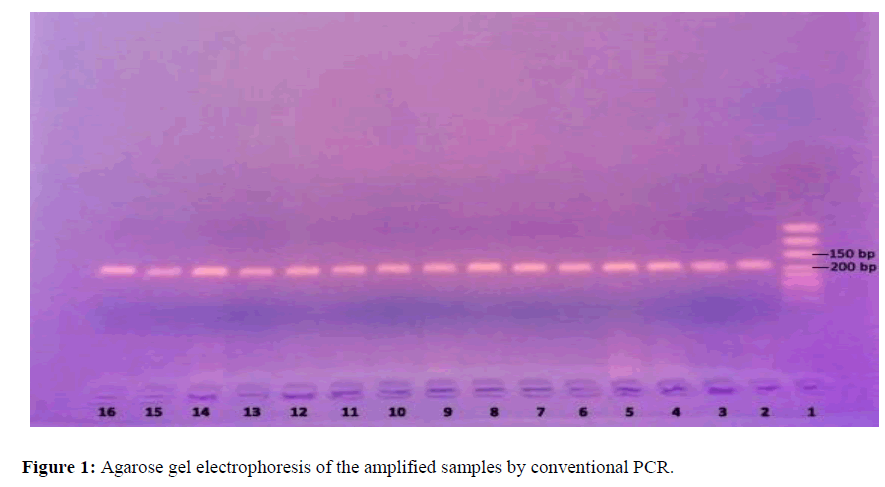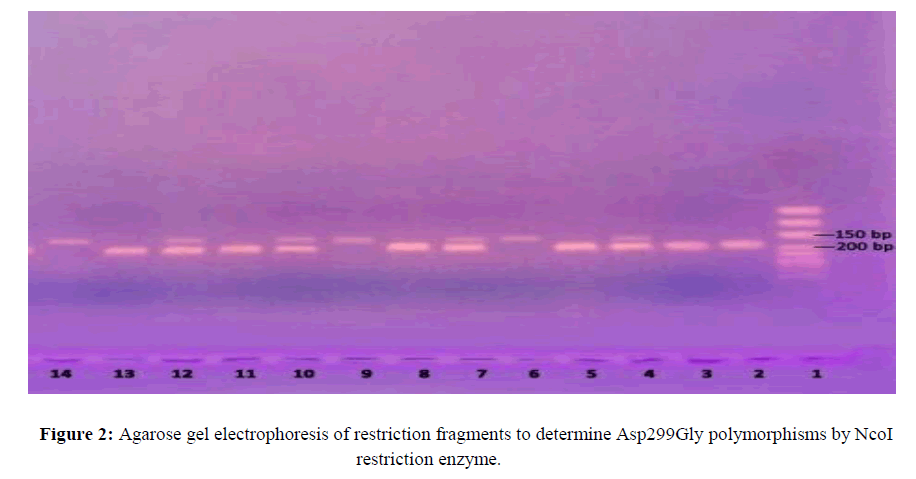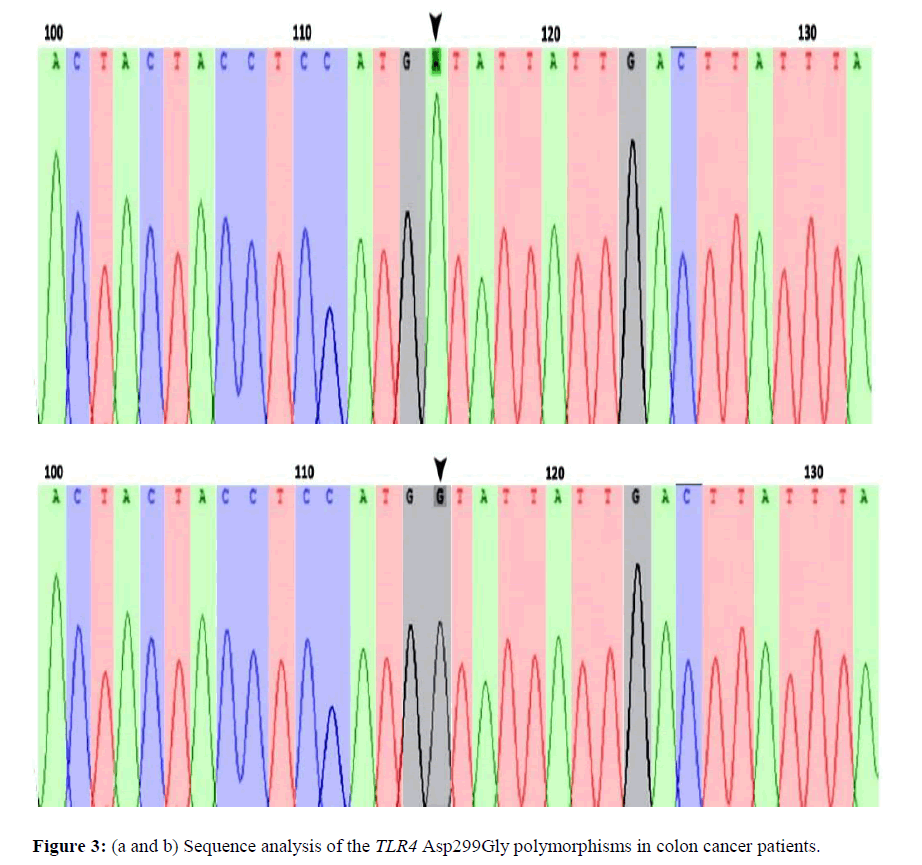Asp299Gly polymorphism in TLR4 gene in patients with colorectal cancer
Received: October 08, 2019
Accepted: November 12, 2019
Published: January 05, 2019
Genet.Mol.Res. 18(1):
Abstract
Background: Toll-like receptors play important roles in innate and adaptive immunity and polymorphisms within TLR-4 as Asp299Gly are reported to be associated with certain digestive cancers e.g. colorectal carcinoma.
Aim: Investigate the association between Asp299Gly polymorphism and the risk of colorectal cancer development and progression.
Setting: National cancer institute, Tanta City, Gharbia Governorate, Egypt and/Tanta University Hospitals, General surgery Dept.
Study design: A case control study.
Patients and Methods: the study included 40 newly diagnosed patients with colorectal cancer recruited from patients attending National Cancer Institute and 40 apparently healthy individuals from relatives/visitors of patients matched in age and sex. For each of patients and control group genotyping of TLR-4 gene by PCR/RFLP was done and confirmed by direct sequencing.
Results: TLR-4 Asp299Gly homozygous and heterozygous genotypes were detected in 50% and 30% of the patients respectively. The difference was statistically significant; TLR-4 Asp299Gly homozygous and heterozygous genotypes were significantly associated with advanced stages.
Conclusion: TLR-4 Asp299Gly polymorphism is associated with increased susceptibility for CRC development and progression.
Keywords
Colorectal cancer; Toll-like receptors; Asp299gly.
Introduction
Colorectal cancer is one of the most common cancers worldwide. Its incidence rates are rapidly increasing in several areas in the world, probably related to a combination of factors like diet, obesity, smoking, gut microflora and genetic changes (Mahfouz EM et al., 2014). Toll-like receptors (TLRs) are important pattern recognition receptors expressed by immune cells. The response to TLR ligands may be impaired by single nucleotide polymorphisms that are present in TLR genes (Davoodi H and Seow HF, 2011). For example, Asp299Gly polymorphism, which occur in exon 4 of the human TLR4 gene, is located within the extracellular domain of the receptor and has an impact on TLR4 signaling and potentially on intestinal homeostasis due to impaired control signals at the epithelial cell level leading to chronic intestinal inflammation and interrupted intestinal homeostasis and hence may lead to CRC (Nissar S et al., 2017).
Patients and Methods
Study design
A case control study was designed.
Study sample
The study included 40 patients with newly diagnosed CRC, presented to Tanta Cancer Center from August 2015 to Feb 2017 (cases) and 40 apparently healthy individuals with no signs of any malignancy matched for age and sex as a control group was recruited from relatives and/or visitors.
Method
Personal data from both patient and control groups were collected through direct interview. Blood samples: Two ml of blood were collected from both cases and control under complete aseptic technique in EDTA vacutainer tube and stored at -20°C for molecular investigation. Investigation of medical records and pathology reports of each patient to collect data regarding tumor location, stage, grade of differentiation, lymph node status.
Ethical considerations
• The protocol of the study was approved from the ethical committee of Faculty of Medicine, Tanta University
• Written informed consent was obtained from all participants before their inclusion in the study.
Detection of TLR4 Asp299Gly (rs4986790) variants by PCR-RFLP method confirmed by direct sequencing: DNA analysis was carried out for both groups (newly diagnosed colorectal cancer and the reference control group). DNA was isolated from the peripheral whole blood by using DNA extraction kits (QIAamp DNA Blood Mini Kits Cat No. /ID: 51104). The DNA purity was determined by calculating the ratio of the absorbance at 260 nm to absorbance at 280 nm. Pure DNA had an A260/A280 ratio of (1.7-2.0).
Briefly, DNA was amplified in a 50-μL reaction mixture containing TLR4 Asp299Gly primers (forward, 5-AGC ATA CTT AGA CTA CTA CCT CCA TG-3; reverse, 5-GAG AGA TTT GAG TTT CAA TGT GGG-3), respectively, 1x PCR buffer, 1 unit Taq polymerase, 1.5 mmol/L MgCl2, 0.2 mmol/L deoxynucleotide triphosphates, and 20 ng DNA. For PCR amplification, the standard program was used as follows: 35 cycles of denaturation at 95°C for 3 min, annealing at 51°C C for 30 seconds, 72°C for 30 sec followed by final extension at 72°C for 10 min and hold at 4°C for indefinite hold. TLR4 PCR products (188 bp) (Figure 1) were incubated overnight with NcoI restriction endonuclease at 37°C. For, TLR4 Asp299Gly one band of 188 bp was identified as homozygous wild type AA, while three bands of 188 bp, 168 bp and 20 bp were identified as heterozygous variant allele AG and the homozygous mutant type GG displayed two bands of 168 bp and 20 bp (Figure 2). The results were confirmed by direct DNA sequencing (Figure 3).
• Lane 1 is the DNA ladder
• Lanes 4, 7, 10 and 12 are heterozygous (AG)
• Lanes 6, 9 and 14 are homozygous mutant (GG)
• Lanes 2, 3, 5, 8, 11 and 13 are wild type (AA)
The arrow indicates the nucleotide base changes; A nucleotide in Wild-type was substituted with G nucleotide in Asp299Gly polymorphism
Statistical Analysis
Statistical presentation and analysis of the present study was conducted, using the mean, standard deviation, unpaired "t" test and Fisher's exact test by SPSS V.16.
Results
This study included 40 patients with newly diagnosed CRC and 40 healthy individuals served as control group. The characteristics of the study population were summarized in Table 1. Briefly, mean age was 45±11.1 years, 52.5% were males, 40% of the patients were smokers and the mean MBI was 25.2 kg/ m2. As shown in Table 2. Colon cancer accounted for 72.5% of the total CRC cases while rectal cancer accounted for 27.5% of the total cases. 60.0% of the cases were in stage I-II while 40.0% of the cases were in stage III-IV. 32.5% of the CRC were well differentiated, 35.0% were moderate differentiated and 32.5% were poor differentiated. Forty percent of the patients presented with liver or LN metastasis.
| Patients (Group I) No. (%) |
Control (Group II) No. (%) |
Test of sig. | P value | |
|---|---|---|---|---|
| Age (mean ± SD): | 45 ±11.1 | 43.6 ±13.5 | t=0.5 | 0.3 |
| Sex Male Female |
21 (52.5%) 19 (47.5%) |
22 (55%) 18 (45%) |
X2=0.5 | 0.5 |
| BMI kg/ m2 (mean ± SD): | 25.1 (±2.9) | 22.6 (±2.3) | t=4.4 | 0.1 |
| Smoking Yes No |
16 (40%) 24 (60%) |
10 (25%) 30 (75%) |
X2=2.1 | 0.2 |
Table 1: The characteristics of the study population.
| Tumor characteristics | Patients (Group I) No (%) |
|---|---|
| Tumor location | |
| Colon | 29 (72.5%) |
| Rectum | 11 (27.5%) |
| Stage: | |
| I-II | 24 (60.0%) |
| III-IV | 16 (40.0%) |
| Grade of differentiation | |
| Well | 13 (32.5%) |
| Moderate | 14 (35.0%) |
| Poor | 13 (32.5%) |
| Metastasis | |
| No metastasis | 24 (60.0%) |
| Metastatic | 16 (40.0%) |
Table 2: Description of tumour characteristics.
Distribution of Asp299Gly genotype and allele frequencies of TLR4 gene in the studied groups were listed in Table 3 showed; among colorectal cancer patients, 8 of 40 (20%) had a TLR-4 Asp299Gly polymorphism in the form of GG genotyping and 12 of 40 (30%) had a TLR-4 Asp299Gly polymorphism in the form of AG genotyping. In the control group, only 2 of 40 (5%) had a TLR-4 Asp299Gly polymorphism in the form of AG genotyping.
| Variables | Patients | Controls | Test of sig | P value |
|---|---|---|---|---|
| Genotype frequencies AA AG GG |
20 (50%) 12 (30%) 8 (20%) |
38 (95%) 2 (5%) --- |
51.8 | 0.000* |
| Allele frequencies A G |
52 (65.0%) 28 (35.0%) |
78 (97.5%) 2 (2.5%) |
34.7 | 0.000* |
Table 3: Distribution and comparison of Asp299Gly genotype & allele frequencies of TLR4 gene in the studied groups
Comparison of ASP299gly genotyping among CRC patients with different tumor characteristics were listed in Table 4. Briefly, there were no statistically significant differences between ASP299gly genotyping and tumor location. There were statistically significant differences in Asp299gly genotyping and staging of the tumor. There were statistically significant differences in Asp299gly genotyping and grading of the tumor. There were statistically significant differences in Asp299gly genotyping in CRC patients with metastasis and CRC patients without metastasis.
| Tumor location | AA | AG | GG | Test of sig. (t) | P value | |
|---|---|---|---|---|---|---|
| Colon (no=29) | 15 (51.7%) | 9 (33.3%) | 5 (17.24%) | 3.2 | 0.2 | |
| Rectum (no=11) | 5 (45.45%) | 3 (27.27%) | 3 (27.27%) | |||
| Tumor stage | ||||||
| I-II (no=24) | 16 (66.7%) | 6 (25.0%) | 2 (8.3%) | 66.7 | 0.000* | |
| III-IV (no=16) | 4 (25.0%) | 6 (37.5%) | 6 (37.5%) | |||
| Grade of differentiation | ||||||
| Well (no=13) | 9 (69.23%) | 2 (15.38%) | 2 (15.38%) | 47.3 | 0.000* | |
| Moderate (no=14) | 8 (57.14%) | 4 (28.57%) | 2 (14.28%) | |||
| Poor (no=13) | 3 (23.07%) | 6 (46.15%) | 4 (30.76%) | |||
| Metastasis | ||||||
| Metastatic (no=16) | 2 (12.5%) | 8 (50.0%) | 6 (37.5%) | 79.9 | 0.000* | |
| Non metastatic (no=24) |
18 (75.0%) | 4 (16.66%) | 2 (8.33%) | |||
Table 4: Comparison of ASP299gly genotyping among CRC patients with different tumor characteristics.
Discussion
The study revealed that TLR-4 Asp299Gly polymorphism was more prevalent among CRC patients than control. The difference was statistically significant. This can be attributed to the presence of TLR4 variants that affect gut homeostasis resulting in impairment of TLRs activation, thus leading to inflammation and CRC development and progression. Similar results have been also recorded by many workers as Pimentel-Nunes et al., 2013 reported that TLR-4 Asp299Gly homozygous had three fold increased risk of colorectal cancer in Europeans (8% of the cases were GG genotype) (Pimentel-Nunes et al., 2013). Also Semlali et al., 2016 found that the GG genotype of TLR4 Asp299Gly polymorphism was highly frequent in the patient group compared to the control group (0.81 vs.0.1) and was highly associated with the development of colon cancer among the Saudi population (Semlali et al., 2016).
A meta-analysis for TLR4 Asp299Gly polymorphism based on 9 studies by Sheng et al., 2015 suggested that the GG genotype of TLR4 Asp299Gly polymorphism might be correlated with an increased risk of colorectal cancer, indicating that it may serve as biomarker of disease progression than AA and AG genotype carriers (p=0.05) (Sheng WY et al., 2015).
A meta-analysis for TLR4 Asp299Gly polymorphism based on 9 studies by Sheng et al., 2015 suggested that the GG genotype of TLR4 Asp299Gly polymorphism might be correlated with an increased risk of colorectal cancer, indicating that it may serve as biomarker of disease progression than AA and AG genotype carriers (p=0.05) (Sheng WY et al., 2015).
In correlating Asp299Gly polymorphism with different tumor characteristics, we found that G allele (AG & GG genotypes) of TLR-4 Asp299Gly polymorphism was associated with advanced stage (III-IV), poor differentiation and metastatic tumors. These results were in agreement with Eyking et al., 2011 who have shown that advanced diseases and metastasis were significantly more frequently observed in patients with TLR4 Asp299gly polymorphisms than those with TLR4 wild type were (Eyking A et al., 2011). Also Omran et al., 2014 found a significant association of TLR-4 Asp299gly polymorphism with numerous clinic-pathological parameters: tumor differentiation (p=0.027), advanced stage (p=0.03), CRC patients with lymph node (p=0.00024) and metastasis (p=0.001) and concluded that TLR-4 polymorphisms may serve as potential biomarkers of CRC progression (Omrane I et al., 2014) Nissar et al., 2017 found that G allele (AG genotype) of TLR-4 Asp299Gly polymorphism was significantly associated with involvement of lymph nodes (p value=0.01) (Nissar S et al., 2017). Understanding how TLRs enhance angiogenesis could help improve the development of anticancer agents and targeted therapies.
Conclusion
From the result of this study, we can conclude that: Asp299Gly polymorphism (AG & GG genotypes) in TLR-4 gene is associated with colorectal cancer development and progression.
About the Authors
Corresponding Author
S. M. Shoeib
Faculty of Medicine, Department of Clinical Pathology, Tanta University, Tanta, Egypt
- Email:
- Sarahshoeib86@gmail.com
References
- Mahfouz EM, Sadek RR, Abdel-Latief WM, Mosallem FA, et al. (2014) The role of dietary and lifestyle factors in the development of colorectal cancer: case control study in Minia, Egypt. Cent Eur J Public Health 22:215-222. https://doi.org/10.21101/cejph.a3919
- Davoodi H and Seow HF (2011) Variant Toll-Like Receptor4 (Asp299Gly and Thr399Ile Alleles) and Toll-Like Receptor2 (Arg753Gln and Arg677Trp Alleles) in Colorectal Cancer. Iran J Allergy Asthma Immunol 10: 91-99.
- Nissar S, Sameer AS, Rasool R, Qadri Q, et al. (2017) Role of TLR4 gene polymorphisms in the colorectal cancer risk modulation in ethnic Kashmiri population – A case–control study. Egyptian Journal of Medical Human Genetics 18: 53-59. https://doi.org/10.1016/j.ejmhg.2016.04.004
- Pimentel-Nunes P, Teixeira AL, Pereira C, Gomes M, et al. (2013) Functional polymorphisms of Toll-like receptors 2 and 4 alter the risk for colorectal carcinoma in Europeans. Dig Liver Dis 45: 63-69. https://doi.org/10.1016/j.dld.2012.08.006
- Semlali A, Parine NR, Arafah M, Mansour L, et al. (2016) Expression and Polymorphism of Toll-Like Receptor4 and Effect on NF-κB Mediated Inflammation in Colon Cancer Patients. PLOS One 11: e0146333. https://doi.org/10.1371/journal.pone.0146333
- Sheng WY, Yong Z, Yun Z, Hong H, et al. (2015) Toll-like receptor 4 gene polymorphisms and susceptibility to colorectal cancer: A meta-analysis and review. Arch Med Sci 11: 699-707. https://doi.org/10.5114/aoms.2015.53288
- Omrane I, Baroudi O, Kourda N, Bignon YJ, et al. (2014) Positive link between variant Toll-like receptor 4 (Asp299Gly and Thr399Ile) and colorectal cancer patients with advanced stage and lymph node metastasis" Tumor Biol 35: 545–551. https://doi.org/10.1007/s13277-013-1075-6
- Eyking A, Ey B, Runzi M, Roig AI, et al. (2011) Toll like receptor 4 variant D299G induces features of neoplastic progression in Caco-2 intestinal cells and is associated with advanced human colon cancer. Gastroenterology 141: 2154–2165. https://doi.org/10.1053/j.gastro.2011.08.043
Keywords:
Download:
Full PDF- Share This


